
Your complimentary articles
You’ve read one of your four complimentary articles for this month.
You can read four articles free per month. To have complete access to the thousands of philosophy articles on this site, please
Interview
Slavoj Žižek
In a London café, Anja Steinbauer chats with the philosopher who invented the word ‘idiosyncratic’.
So Professor Žižek –
Don’t call me professor if you don’t want me to kill you. I feel so uneasy when someone calls me professor. Where is the professor? I have a deep problem with any official titles and so on. I’m not proud of it. When someone calls me professor I take it automatically as an irony.
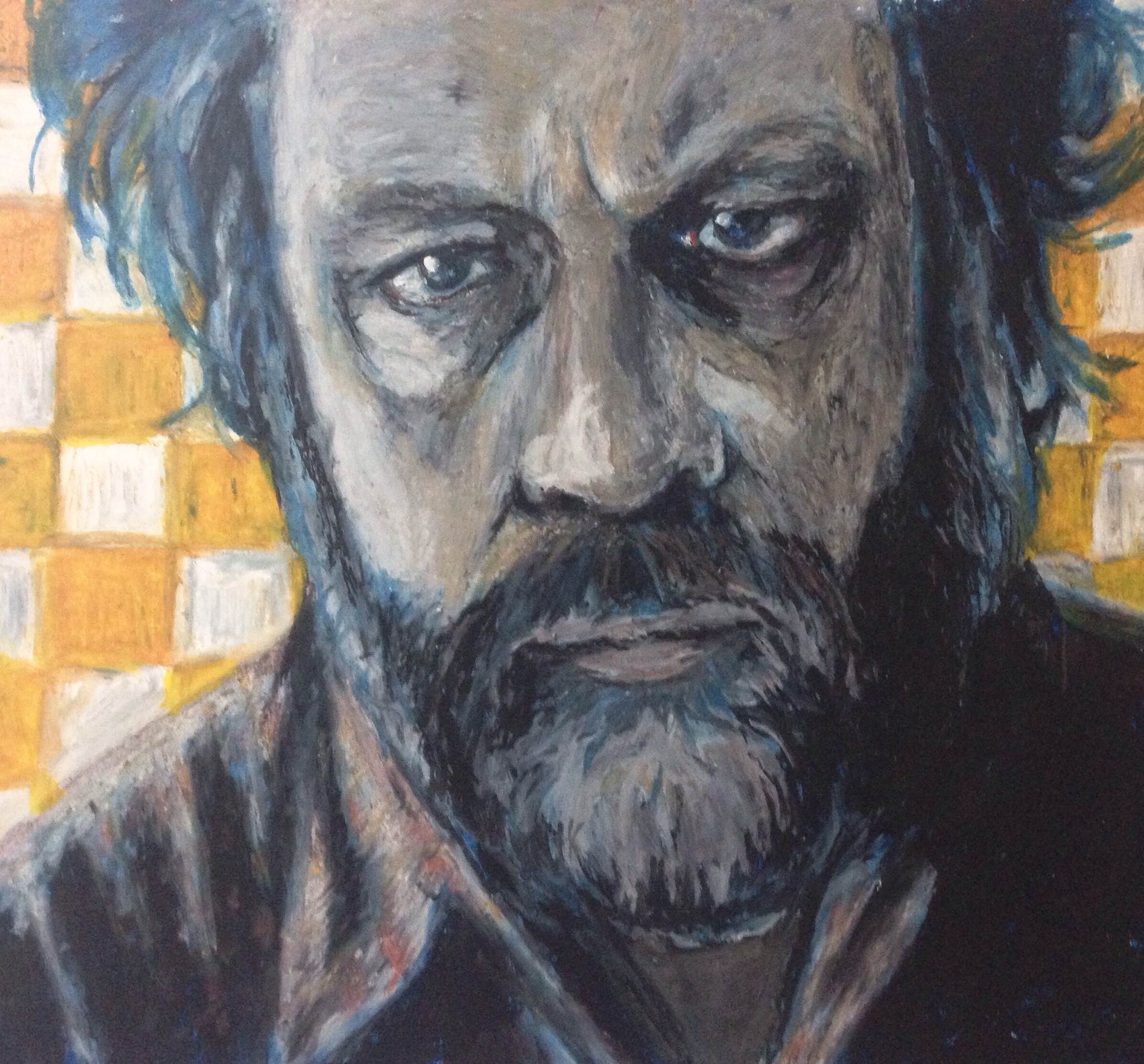
Slavoj Žižek by Woodrow Cowher
A most obvious fact about you is that you are not just a philosopher but a famous philosopher – a rare thing. What does it mean to you to be famous? Is fame important?
First of all, fame is very relative. I have, as you know, many enemies: people who think that I’m just a clown, people who think that beneath my amusing nature there is some evil protofascist or Stalinist dimension and so on. So I think my so-called fame is basically just a way to keep me at a distance and not engage seriously with what I am doing. What I’m really proud of is, you know my crazy book Less Than Nothing, the one that is almost the length of the Bible? It sold very well. That gives me hope that we nonetheless shouldn’t underestimate the public. The publishers put pressure on me to write a nice best seller on Donald Trump. But why should I? He’s not interesting as a person; he’s a boring idiot.
But are you worried about your books becoming coffee table books? You know, people buy them but don’t actually read them?
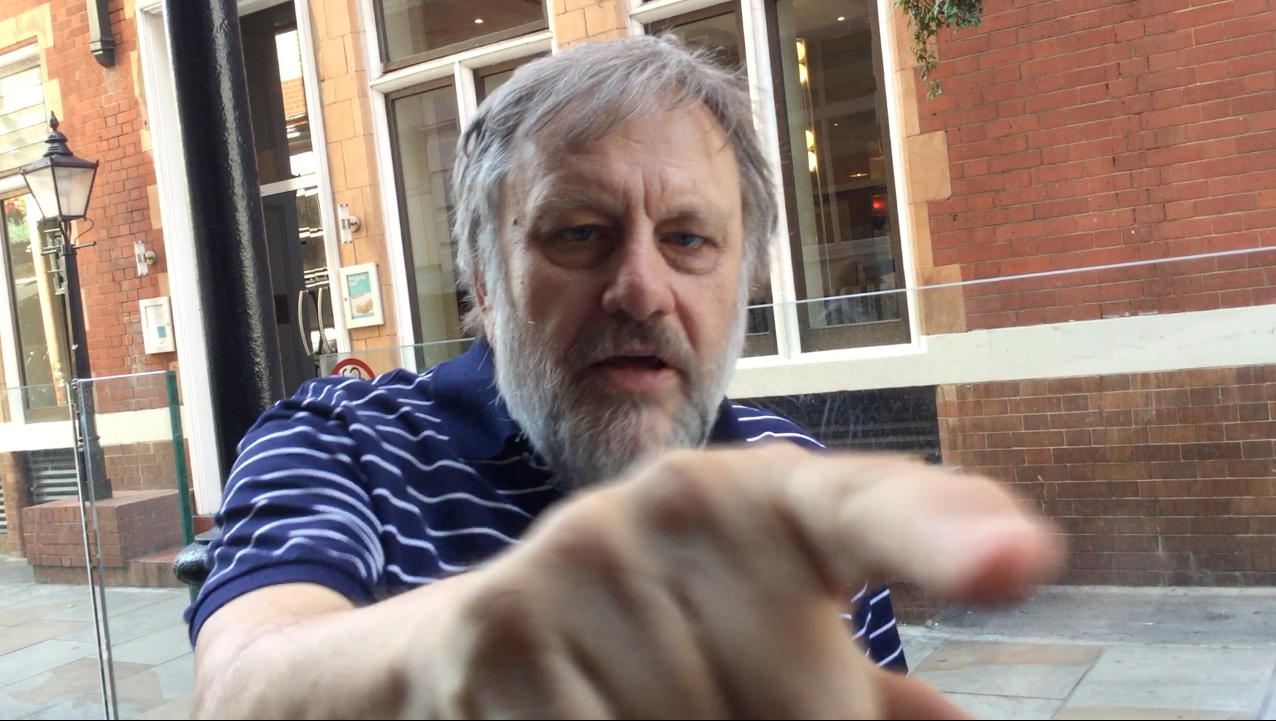
I am, but it isn’t just coffee table books that go unread. Take big best-sellers, classics; people buy them but nobody really reads them either. For example take John Rawls’ A Theory of Justice – I know in New York people who wrote a book on Rawls and privately they admitted to me they hadn’t read it. And I think they’re right because unfortunately with the way Rawls writes, you really can condense it into 50 pages and you don’t lose a lot. I have some suspicions that up to a point it is similar with Hegel. With his Logic I have doubts if people really read it but in a way I don’t think it matters. Did you read a wonderful book by French author Pierre Bayard, which is called How To Talk About Books You Haven’t Read? In the best French style, it’s not just irony. He takes it seriously that the best books about certain authors are written by people who didn’t read all of it. He says you should focus on one feature and then let this one feature colour your entire approach. This is the only way to produce something really new. That’s the paradox of philosophy – you don’t have to read it all. If you know too much, you just get confused.
If people were buying your books and not reading them, would you nonetheless see this as a good sign that people are interested in philosophy?
Yes, my secret hope is that there is a certain strata of people who are not just looking for jokes. After this series of my latest, more philosophical, books like Absolute Recoil (which, if you ask me at gunpoint, I think that’s my – sorry to say this – my best book), I got hate mail like, ‘where are the jokes?’ Some people accuse me that behind my vulgar jokes I am a very traditional philosopher. In some sense they are right. The reason I even use Lacan is strictly as a means to re-interpret Hegel. The big thing in the history of philosophy is the move from Kant to Hegel.
What do you think philosophy can or should do in our time, and is Hegel particularly significant?
Absolutely. Maybe today is not the time to try to change the world but instead to step back, precisely to think. What we need today is a materialist reversal of Marx back to Hegel. Hegel is in a subtle way much more materialist than Marx. You know which Hegel I like? When he says in his Philosophy of Right “the owl of Minerva takes flight only in the evening.” This simple sentence belies the usual claim that Hegel was a conservative whose Philosophy of Right advocated an almost protofascist type of society. When Hegel says a certain historical order can only be understood when its time is almost over, do you really think Hegel was such an idiot that he didn’t know the same must hold for his Philosophy of Right? He doesn’t paint a system of how our society should look. He paints a situation whose time had passed and he knew it. Our situation is much more like Hegel’s than Marx’s. Marx still believed in some kind of minimal teleology, that we are at the crucial point where there is a chance, if not necessity, of proletarian revolution or universal redemption, while Hegel perceived his situation as a post-revolutionary one. Take the French Revolution; in some sense it has gone wrong, but Hegel is here to repossess it. The whole problem of his thought is not to say that the French Revolution was bullshit, but how, in spite of catastrophic outcomes, to keep its legacy alive. And I think our situation is the same; 20th century attempts at radical emancipation have failed. We have to abandon the Marxist metaphor that we are riding the train of history. Marxists like to say that even if times are dark, we can see the light at the end of the tunnel. And ironically I like to say “yes, it is, but it is the light of another train coming.” So that’s our situation and Hegel knew it. It’s open; we cannot make any plans.
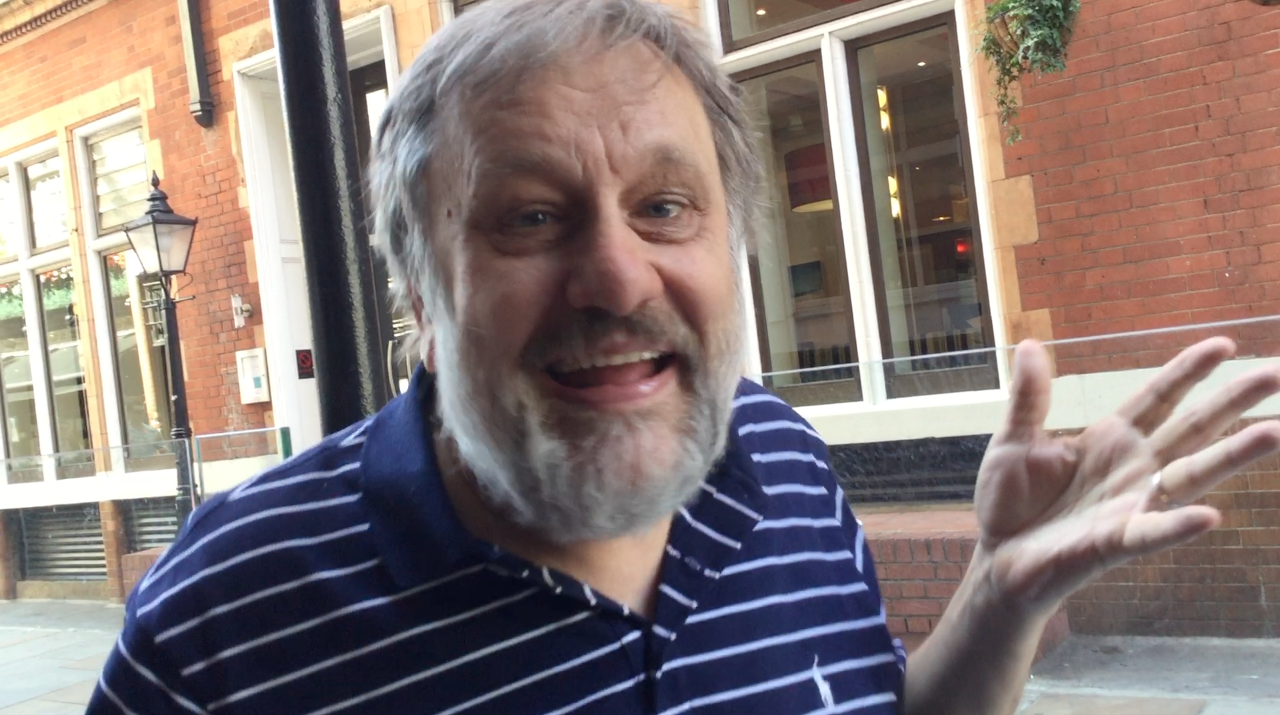
But the light could be anything – it doesn’t have to be another train. Couldn’t it really be the light at the end of the tunnel?
Yes, but that’s why the beginning is to get rid of false hopes. Even the left today, mostly left-wing Fukuyama-ists, basically think liberal democracy and some type of capitalism are the only game in town, so they say let’s just make it better – more solidarity, healthcare, gay marriages etc. My answer to Fukuyama is okay let’s say you are right, capitalism won. Isn’t the irony today that the most efficient managers of global capitalism are the communists who are still in power? I think we have to finally accept that the way we did things in the 20th century is over.
Could there be a problem with our using these labels? When you say things like “capitalism is driven forward by communists in power”, what exactly do you mean by capitalism? It takes many forms. And the communists who drive capitalism, of course aren’t really communists, although they might still call themselves that.
Well, in what sense am I still a communist? In a very limited sense. Aren’t we today witnessing a great irony? Whatever remains of the left is not able to offer an actual feasible global alternative. I remember when there was Occupy Wall Street, I was with them in New York and I kept asking them a stupid question: “What do you want?” And nobody gave me an answer. I think precisely because they don’t know what they want. The left takes escape into moralism, the excesses of political correctness and so on. And here is the problem: on the one hand we have these protests which don’t have a clear aim and on the other hand don’t we get clear signs all around, that capitalism, at least as we know it, is approaching an end? Look at ecology; it’s obvious that although capitalism can do something through taxes and regulation it’s not enough. Look at the fictional capital and people trading fictional capital. Then there is the problem of refugees. If you ask me, capitalism is falling apart. When there is a big catastrophe you need larger actions. Look at biogenetics; our brains can be wired directly to our PCs. This will change the very definition of what a human being is. And here we have the very first sad consequence, as I always warned; the ideal country today is a country that is fully integrated into a global market but at the same time ideologically ethnocentric, focused on its own culture. Even Trump is doing this. That’s why Trump gets on well with dictators. China, India, Putin are playing this game. We are approaching a new world where a global market will coexist with a lack of universally accepted emancipatory rules. This is very sad, but to go back to your question: why communism? Because I think all the problems I enumerated are ultimately the problems of what Marx called ‘commons’. This means some shared substance, which shouldn’t be privatised and left to the market. Ecology is the problem of our natural substance, to what extent we can manipulate it. Intellectual property is also a problem of commons, so is biogenetics. In this sense, as I put it once ironically, communism is not the solution but the name of the problem today. We will have to find the solution at that level: of how to deal with commons outside of market relations. My friend Peter Sloterdijk – in his book What Happened in the Twentieth Century? – also comes to the same conclusion: the era of nation state, where the highest ethical value of ‘are you ready to sacrifice yourself for your country?’ is over. We need larger transnational forms of coordination; it’s the only way to deal with biogenetics for example. Though a good Marxist I am not altogether against capitalism, because it is the most dynamic system in the history of humanity. But I am totally opposed to relying on local indigenous traditions to fight global capitalism. No! We have to fight it on its own terms with a new universal global vision. My point is that we have to go through capitalism, but at the same time we have to move on, not because I am a utopian and want more, but it is clear that capitalism is approaching a crisis in the sense that the problems it encounters today from ecology and so on. Here I am a pessimist in the sense that capitalism will not be able to resolve them in its own terms. I find it irrational that people fear globalisation because it will cause unemployment. I say no, this is the best chance we will ever have! Nobody says: “Perfect! We can work less!” No, the automatic assumption is that it is a catastrophe.
So what is the philosopher to do? Do you look at yourself mainly as a theorist? You’ve also talked about your activism; is there a connection between theory and practice?
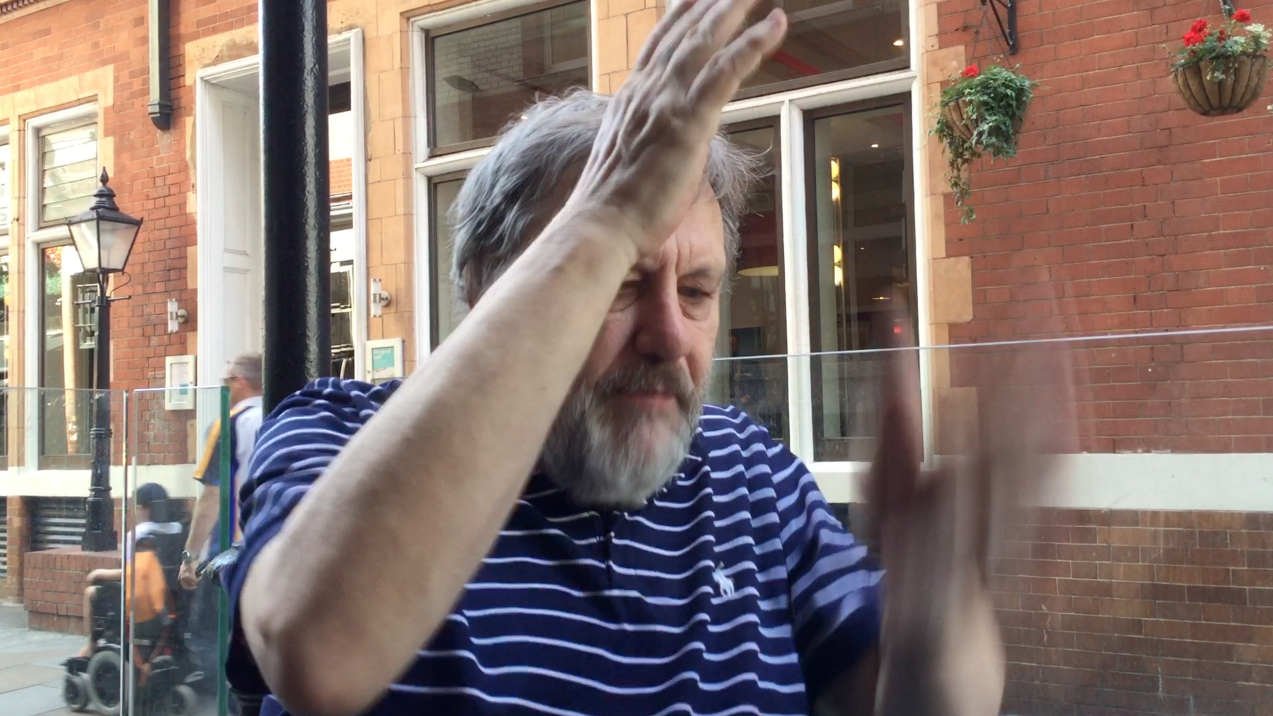
You need theory to see where activism fails. Especially left wing political theory. Isn’t the whole story of the left in the last century one big history of catastrophic failures? Which is why I say the best Marxist books were usually analyses after the fact of why a revolution had to go wrong. Isn’t it sad that all we get are excellent analyses of why we lost? So why philosophy? Firstly because I don’t trust practice. Practice is blind without theory. We need theory today more than ever and by theory I don’t mean direct activist theory.
Do you think practice really follows out of theory?
I will be modest here: it’s doubtful if philosophers will provide a new political programme. But here I follow Deleuze who says that more important than to give the right answers is to ask the right questions. And here philosophy can be of some use. We are dealing with serious problems today. But what if we analyse the extent to which the very way we formulate these problems doesn’t resolve them, but reproduces the problems.
You mention political correctness. Do you think it’s a problem?
I have doubts about political correctness. Of course I agree with its goals – no humiliation, against power relations – but think about the figure of ‘human being’ that is silently presupposed by political correctness, its obsession with harassment and victimisation, we are always threatened. I look into your eyes for two seconds too long – visual rape. The vision beneath political correctness is very sad, a vision of ‘we are all potential victims’.
Doesn’t political correctness on the whole just tell us that we should adjust our language to the reality of the world rather than the prejudices that we hold?
But the way it does it misfires. For me, the true step beyond racism is not to change language, but even to use the same language but in a different, ironic, non-racist way. I doubt you can have real contact with another person without a small exchange of obscenities.
I was wondering whether you think there is a single philosophical question that is the salient question of our time?
Maybe the status of appearance. The usual problem, even for Kant, is always: “Are we limited to our world of appearances? Can we move beyond, to reach reality itself?” The greatness of Hegel is that his problem is the opposite one: How can reality appear to itself? Because appearance means a terrible gap. Things are not directly what they are, they appear to themselves. Here I am absolutely Hegelian. The minimum of reflexivity – appearance – is absolutely universal. For me, the lesson of quantum physics is that appearances matter – how you measure it, how things appear, determines how things are.
Is there a translation problem here? When one talks about the quantum level, there is often a gap in understanding…
I am totally opposed to those simplists who want to somehow ground the possibility of human freedom directly into uncertainty or the indeterminacy of reality. What attracts me is an abstract idea, the idea of ontological incompleteness of reality. What if reality in itself is not fully real? Here’s my favourite story, which I found in a popular introduction to philosophy. The guy who wrote it tried to read quantum physics by basing it on video games. When you are immersed in a game, reality there is not fully constituted. For example, you have a forest in the background. If it is not part of the game to go into the forest, then the trees are not programmed in detail; you just see the outside. Why did the programmer not construct full reality? Because he would just lose time, it’s meaningless. Why program the inside of a house if it’s not part of the game? The idea – isn’t it a wonderfully simple one? – is that God did the same when he created the universe. He stopped at a sub-atomic level because he thought humans would be too stupid to progress so far, so why bother to program velocity and so on? And the idea is a nice, cynical one. God underestimated us – with quantum physics we, as it were, caught God with his pants down. But now comes the true definition of materialism for me. We can fit in this incompleteness without God, we don’t need a creator. Reality just is incomplete. That is one mega result, and there are many others.
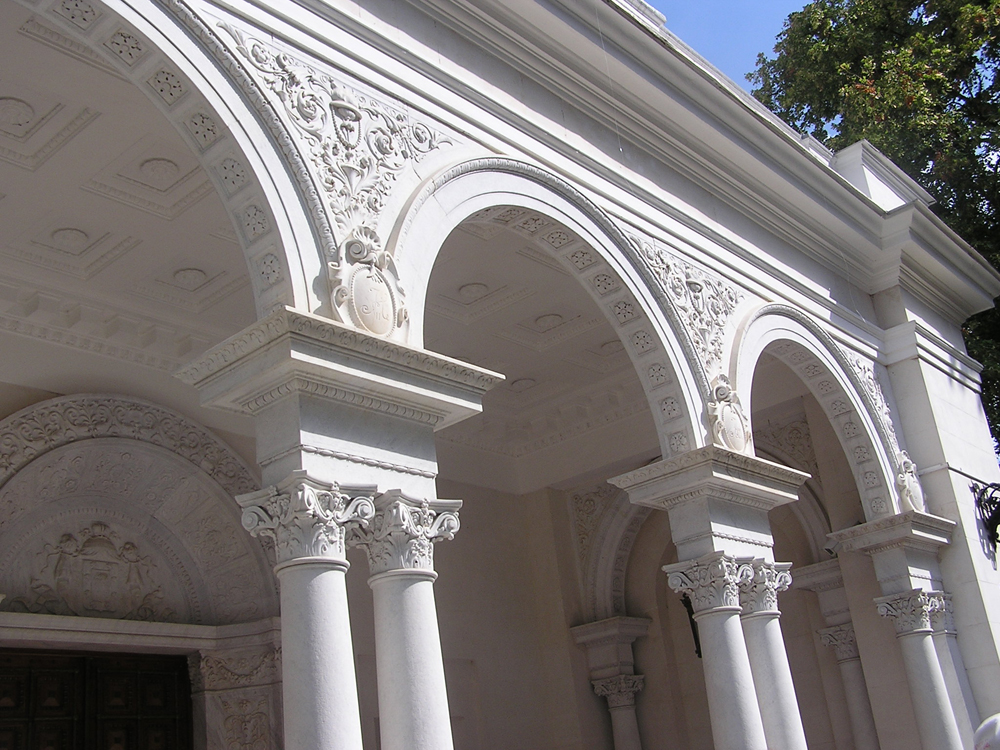
Spandrel – a term from architecture: if you build a colonnade with arches then necessarily there will be v-shaped gaps between the tops of the arches. These gaps are called spandrels. They aren’t the aim of the design but they are an inevitable by-product of it.
Let’s talk a bit about your new book Incontinence of the Void: Economico-Philosophical Spandrels. I read that you explore “the empty spaces between philosophy, psychoanalysis and the critique of political economy.” So you talk about spandrels, a concept which comes from architecture but finds uses in evolutionary biology. So to talk about spandrels is to assume the integrity of those disciplines…
Here I would doubt it. Why? My solution would have been: what if everything, in order to exist, needs a spandrel, needs an empty place that can be transformed? This is the thesis of Stephen Jay Gould. The whole of evolution according to Gould is based on spandrels. You have empty spaces, you have organs of no use, like the appendix. The beauty of Gould’s idea is that he interprets human language in this way – it’s a by-product.
But spandrels are by-products of things that are actually driven by adaptive value [i.e. have developed because they have evolutionary survival value].
Yes, but for him adaptation works through spandrels. That would be my view too. The paradox is that the thing itself cannot ever conceptually fully fit its function. You need by-products. Our entire human progress, and even progress in the animal kingdom, is based on by-products. Let me put it like this, something happens with modern philosophy (and by modern philosophy I’m old fashioned here; I mean post-Kantian thought) which creates a privileged link with other fields. With, for example, psychoanalysis. I claim that Freud was not simply a positivist scientist. This is maybe the fundamental thesis of my work. The philosophy, or philosophical stance, implied by Freud is not some simple naturalism in the sense of saying sexuality is important. What Freud proposes is a whole vision of humanity that fits Kantian philosophy or German idealism. For me, my ultimate task would be to read German idealism again, against the background of what psychoanalysis brought us. Because psychoanalysis is a much more delicate thing; it’s not this substantialism of the unconscious, or all these stupid metaphors like “our conscious ego is just like the tip of the iceberg.” No, the unconscious is purely phenomenal for Freud. My programme is that only by reading psychoanalysis through German idealism can we arrive at what the psychoanalytic revolution really amounts to – and vice versa too. Only by re-reading it through Freud can we keep alive the tradition of German idealist philosophy. There we have the connection between Freud, sexuality, sexual difference and ontology. My next step involves an old-fashioned Marxist notion: the logic of ‘surplus value’ that we find in capitalism, where a thing – a commodity – cannot exist without its surplus, and what appears as a secondary surplus is the very motive that triggers its creation.
In the second part of the book I go into detail about the parallel between this notion of surplus value and what Lacan calls ‘surplus enjoyment’: the additional twist which changes simple pleasure into what we usually call in more emphatic terms ‘enjoyment’. What fascinates me is a horrible political example of enjoyment of pain: Goebbels’ Totaler Krieg speech in early 1943. He does something ingenious in a terrifying way. All he promises to German people is more suffering. He says: “Do you want a war that will be so total that you cannot even imagine how much you will suffer?” And they all cheer. So this is a paradox of pleasure in pain, or (and now I am jumping again) for a certain type of sexuality, maybe it is Protestant sexuality, if you don’t feel guilty you don’t really enjoy it. You have to add guilt to pleasure to really enjoy it. And I think all these twists show how an obstacle – in this case, guilt or pain – far from blocking the thing, conditions it, and keeps it moving. This fundamental imbalance, the surplus that borders harmony, is the very retroactive condition of harmony. Marx traced it but he wasn’t radical enough. Marx’s dream of communism was that we can get capitalist dynamics without the obstacle, without this paradox. For me, capitalism is in this sense an ontological phenomenon. It’s the first social order, the only one in the history of humanity, where imbalance is not a problem but a solution. This is why Marxists have a problem with capitalism; they always count on a crisis bringing it down, but actually the more capitalism is in crisis the stronger it emerges out of it. So I deal with this ontological consequence of capitalism and then I do something very pessimistic at the end. I claim that in the classical Marxist view, proletarian revolutions will not be contained in this bourgeois deadlock, you want something like freedom and the result is catastrophic. No, we have to accept that all revolutions, even proletarian ones, are caught in a process that they don’t dominate.
So there are never any controlled revolutions?
Yes, there are no controlled revolutions. It’s a very Hegelian view. Marx thought that proletarian revolution will be a self-transparent act, an act clearly understood by those taking part. At that point in history the working class, the subject, will know what it is doing and do it. But no, it’s not controlled or self-transparent, we get the same historical dialectic as in previous history. At the end of the book I approach the question of mortality in communism. I fight not only against transparency of revolutions but against visions that somehow in communism private life will be better. I say who knows? Maybe it will be worse. Without betraying Marxism I think we should introduce ‘historical density.’ In all social processes they are non-transparent, the result is another one which means that fundamentally we never know what we are doing.
As we bring the interview to a close, our readers might now wonder, of all the books you have written, which should they really read?
Well of mine I think Event: Philosophy in Transit. If you have more energy then also Absolute Recoil. Then of course, there are the three greatest philosophers for me: Plato, Descartes and Hegel. Why? Because each of them defined their whole posterity. As A.N. Whitehead put it: “Isn’t the whole history of philosophy a history of criticism of Plato?” And after Descartes, they all wanted to get rid of Descartes and in the 19th century they all wanted to get rid of Hegel. So those three are all philosophers of an event.
• Incontinence of the Void: Economico-Philosophical Spandrels by Slavoj Žižek will be published by MIT Press in Oct. 2017.
• The video of this interview, filmed by Katy Baker, will be appearing soon on the Philosophy Now website at philosophynow.org.








